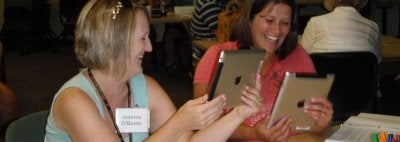

Elementary Math Specialists
Elementary mathematics specialists are positioned in schools to serve as on-site resources and leaders for teachers, providing a deep understanding of mathematics and of how students learn as well as pedagogical expertise. Funded by NSF grants (ESI-0353360 and DRL-0918223), Pat Campbell and a number of graduate students in the Center for Mathematics Education have been conducting the research component of two research and development projects addressing elementary mathematics specialists. These collaborative projects have brought together mathematicians, mathematics educators, mathematics supervisors, elementary mathematics specialists, and education policy experts from 18 Virginia school districts and 5 universities (Virginia Commonwealth University, University of Maryland, University of Virginia, Norfolk State University, and Longwood University). These funded efforts have had two components. First, five mathematics courses and three leadership/coaching courses for prospective elementary mathematics specialists have been developed and implemented in both in-person and blended learning settings. Second, working with graduate students, Pat Campbell has been conducting randomized treatment-control studies investigating the impact of specialists on (1) student achievement and (2) teachers' beliefs about mathematics teaching, as well as studies addressing the knowledge and beliefs of the math specialists and the nature of the specialists’ on-site professional activity. The first research study was positioned in urban-edge school districts, and the prospective specialists traveled to a local university to complete the preparation courses. The second study is positioned across rural isolated schools, and the prospective specialists completed their preparation courses by online, blended coursework during the academic year and by traveling to a university campus for summer, residential institute courses.
Research findings to date indicate that overall, students in urban-edge schools with mathematics specialists for 3 years had significantly higher scores on Virginia's high-stakes, standardized achievement test for mathematics as compared to students in control schools (Grades 3, 4, and 5). This difference in achievement was not evident after the first year of placement of the specialists at any of these grades. The significant increase in student scores was not identified until the second and third year of specialist placement.
Over time, the beliefs of teachers in urban-edge schools who were highly engaged with their mathematics specialist became more aligned with a Making Sense perspective and less aligned with a Traditional perspective, but this change was not evident for teachers who did not have a high level of interaction with their specialist. Further, teachers in the schools with an elementary mathematics specialist were more likely to engage in other forms of available professional development addressing mathematics content and pedagogy than were teachers in the control schools.
While the analysis of student achievement data from the rural school settings is in progress, preliminary findings indicate a statistically significant positive effect on student achievement in Grade 3 for those schools with mathematics specialists, but not in Grades 4 and 5. Accessing daily records data that specialists entered on an iPad, this study found that, on average, the rural mathematics specialists spent only 40% of their time engaged in coaching or in tasks supporting coaching, with the remainder of their time spent on tasks involving a school’s mathematics and student assessment programs (20%), a specialist’s personal professional development (12%), and work not identified with the responsibilities of the specialist position but supported by a school (27%). The variability in specialists’ activity patterns was not simply a function of their school district, as specialists in the same district frequently had differing activity patterns.
Selected Math Specialist Publications
Campbell, P. F. (in press). Reflections on the promise and complexity of mathematics coaching. Journal of Mathematical Behavior.
Campbell, P. F., Griffin, M. J., & Malkus, N. N. (in press). Factors influencing elementary mathematics specialists’ impact on student achievement. In M. B. McGatha & N. R. Rigelman (Eds.), Elementary mathematics specialists: Developing, refining, and examining programs that support mathematics teaching and learning. Charlotte, NC: Information Age Publishing.
Campbell, P. F., &Malkus, N. N.(2014). The mathematical knowledge and beliefs of elementary mathematics specialist-coaches. ZDM: The International Journal on Mathematics Education, 46, 213-225.
Campbell, P. F., Ellington, A. J., Haver, W. E., and Inge, V. L. (Eds.). (2013). The elementary mathematics specialist’s handbook. Reston, VA: National Council of Teachers of Mathematics.
Campbell, P. F., & Malkus, N. N. (2013). Elementary mathematics specialists influencing student achievement. Teaching Children Mathematics, 20(3), 198-205.
Campbell, P. F. (2012). Coaching and elementary mathematics specialists: Findings from research. In J. M. Bay-Williams (Ed.), Professional collaborations in mathematics teaching and learning: Seeking success for all (pp. 147-159). Reston, VA: National Council of Teachers of Mathematics.
Campbell, P. F. (2011). Elementary mathematics specialists: A merger of policy, practice and research. In W. F. Tate, K. King, & C. R. Anderson (Eds.), Disrupting tradition: Research and practice in mathematics education (pp. 93-103). Reston, VA: National Council of Teachers of Mathematics.
Campbell, P. F., & Malkus, N. N. (2011). The impact of elementary mathematics coaches on student achievement. The Elementary School Journal, 111, 430-454
Campbell, P. F., & Malkus, N. N. (2010). The impact of elementary mathematics specialists. The Journal of Mathematics and Science: Collaborative Explorations, 12, 1-28.
Members of the Maryland Math Specialist Projects (since inception)
Patricia Campbell, Matthew Griffin, Nathaniel Malkus, Kathleen Clark, Julie Cymek, Dongquan Zhang, and Sarah Kimball